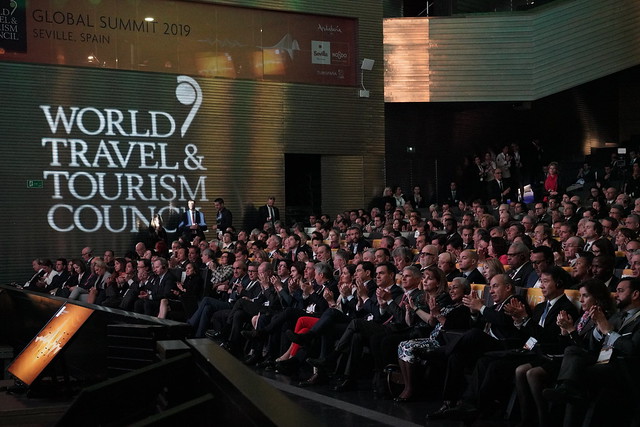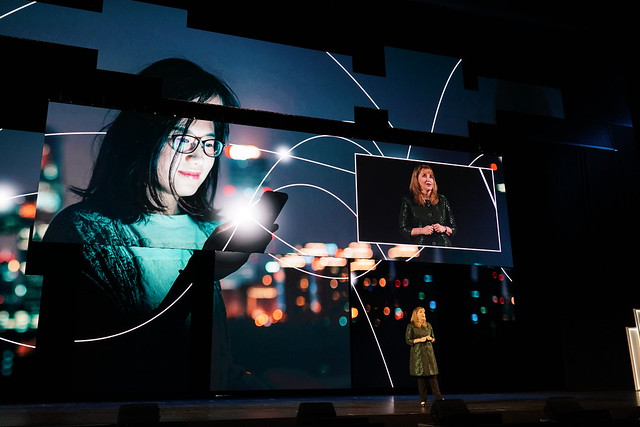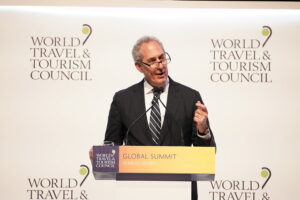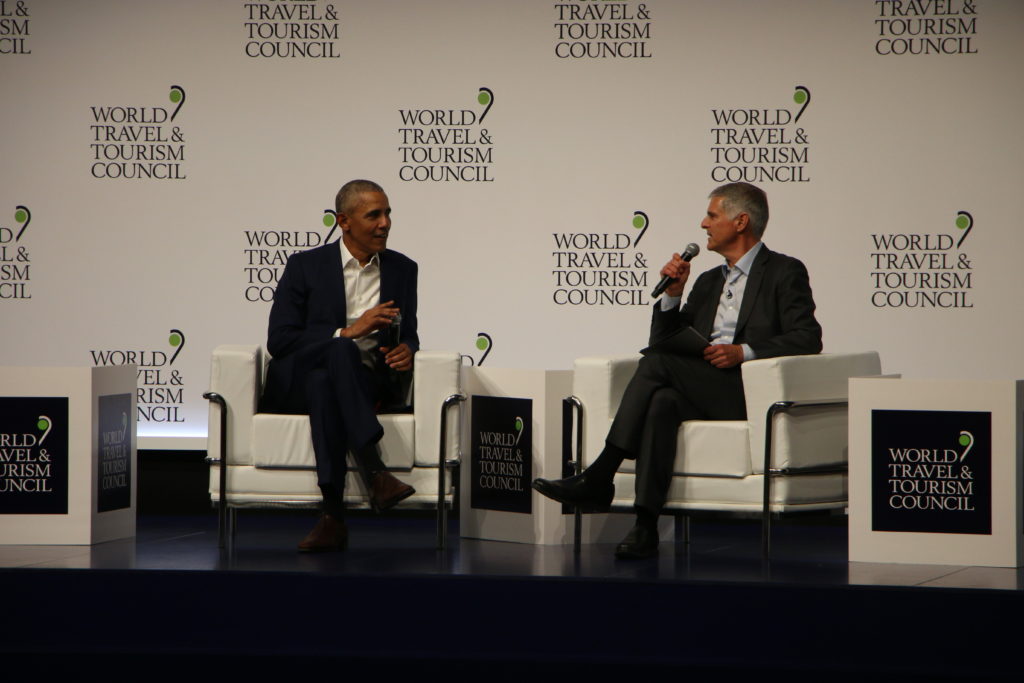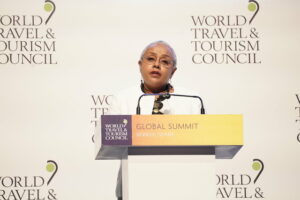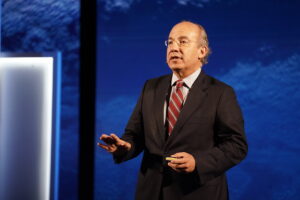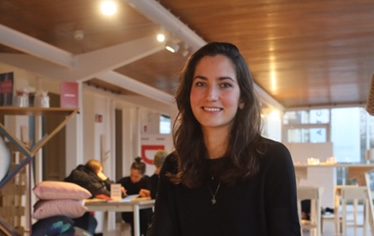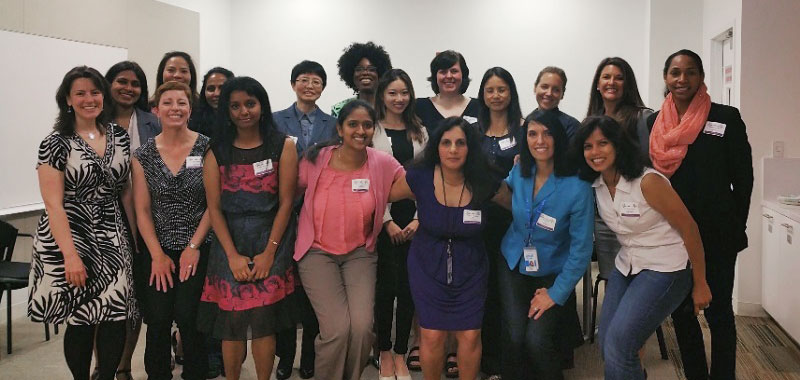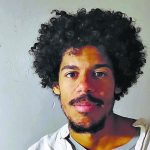A resounding success. This is how Gloria Guevara, CEO of the World Travel and Tourism Council (WTTC), described the development of the largest world summit on tourism and travel held in Seville on 3 and 4 April. According to his declarations, it has been the congress with more participants in all the history of the WTTC. The summit has welcomed more than 1,650 delegates, including more than 100 corporate CEOs, nearly 500 national and international media and 30 ministerial delegations.
It was during the inauguration of the summit when Christopher J. Nassetta, Chairman of Hilton, announced 3,000 million euros of investment in Spain during the next two years by the companies that make up the WTTC. Subsequently, Gloria Guevara indicated that this amount only corresponded to 15 of the 85 companies that are part of the WTTC, so the total will be significantly higher, assuming a 50 percent higher than the investment committed in the previous city that hosted the summit, Buenos Aires. She also highlighted «the important consensus of all the participating authorities, both public and private sector, regarding the need to advance in the development of a more sustainable, innovative and advanced tourism model».
Leaders of the sector: for a digital, inclusive and sustainable future
Different CEOs, executives and world leaders in the business and tourism sector highlighted in the WTTC summit which will be the main challenges, keys and trends of tourism worldwide in the coming years, which will be marked by a «digital, inclusive and sustainable future«. During his conference, the president of the multinational Telefónica, José María Álvarez-Pallete, said that «today’s society is in the process of digital transformation, with new technologies such as artificial intelligence, Big Data, virtualization, or printers. 3D, which will change the forms of consumption, also in the field of tourism. » He also said that «it is the people who must give meaning to technology and not the other way around». In relation to 5G, he indicated that «it will be a massive data explosion and allow intelligent connectivity.» The president of Telefónica also explained that the future passes through a network (Internet) and intelligent connectivity, more accessible and more personalized towards customers and consumers, and set the example of fiber optics as an opportunity that Spain can take advantage of in this field. to continue growing in the tourism sector. «In our country there is more fiber optics than in Germany, France and the United Kingdom combined, and that potential should be exploited,» he concluded.
For his part, the vice president of MasterCard, Michael Froman, stressed that globalization began 500 years ago in Seville, and has changed the history of humanity, but «growth has not always been inclusive.» «We have to share economic growth and wealth, and the tourism sector is key in this. It accounts for 8% of world exports and 14% of world GDP. In addition, emerging economies account for 45% of tourism. » He also pointed out some aspects in which tourism can contribute to more inclusive growth, such as knowing where it is invested and spending on the activities of the sector, and thus, «the more you know, the better results you would get and the better you could share. wealth distribution». He also highlighted the generation of employment in the tourism sector, and how it can be integrated into the internal networks of the countries, and the use of technology as a tool to improve tourism services and make a more fluid travel experience for customers.
Finally, the Chairman of National Geographic, Gary Knell, said that traveling is a way to change the world, and that all companies and organizations linked to the tourism sector should ensure a sustainable future. «Our responsibility is to promote sustainability. There have been more than 1.4 billion tourist trips. We have to transform the industry by ensuring this sustainable future, avoiding negative impacts on the environment. There are species, animals and places threatened on the planet, and tourists want to travel and know new places, but also take care and preserve those spaces and species. Tourism and sustainability are not enemies, we must find a balance between business and respect for nature and the environment and that is possible. Sustainable tourism is a great opportunity to learn about the magnificent places our planet has».
Barack Obama bet on young people as a driver of change
Undoubtedly, the intervention that aroused most interest was Barack Obama. Interviewed by Christopher J. Nassetta, president of the Hilton chain, the former president of the United States reflected in Seville on climate change, immigration, human rights, cultural diversity, gender equality and the media.
For the former president of the United States, «the disruptions that technology generates make people feel insecure and create walls to preserve what they think they are, which is very dangerous.» In this sense, he assured that the industry travel «should remind people of planetary diversity. Traveling reminds us of what we share and what we have in common. »
Among other issues, he spoke of the need to inspire young people to become involved and be the engine of change at all levels and throughout the world. For Obama, «young people are ready to set sail, they do not get scared by differences, changes, what is unfamiliar to them because they are accustomed to seeing the world through mobile phones.» The generations that come are more aware of the rights and responsibilities but politicians do not attract anything, so we must work to involve them, rebuild institutions so that they find their concerns are represented«. He also gave as an example the projects that the Obama Foundation develops in Africa, stating that «there, a number of young leaders are emerging, with environmental awareness, with an entrepreneurial spirit. They are tired of the old way of doing business. »
In relation to climate change, Barack Obama said that «it is a monster that is here and we already see its impact». In addition, it believes that it will contribute to new migration patterns «that can not be contained with a wall». For the former US president, «current policies are not designed to face these challenges.»
The Sevillian company City Sightseeing announces a pioneering system based on big data to measure the flow of tourists
Headquartered in Seville, City Sightseeing is one of the international leaders in the field of panoramic tour buses with urban routes. It is part of the World Travel and Tourism Council, and its advisory work to the City of Seville, the Junta de Andalucía and the Central Government contributed to Seville being designated as the venue for the summit.
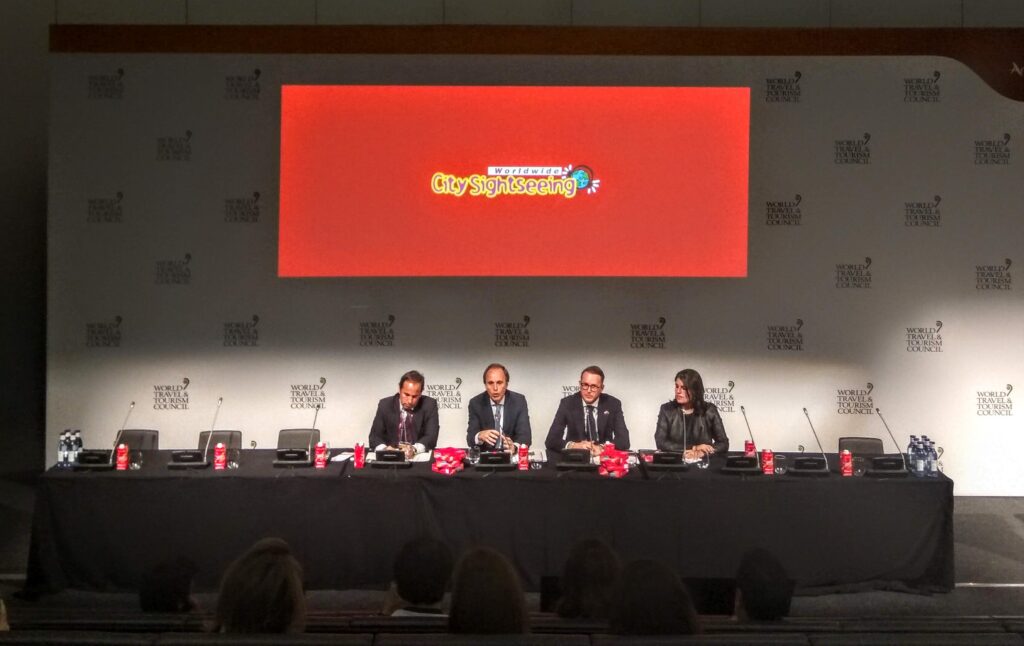
Enrique Ybarra and Jerónimo Cárdenas, CEO and General Manager of City Sightseeing, during the presentation at the WTTC Summit of the new system to measure tourist flows.
During his participation in the summit, Enrique Ybarra, CEO of City Sightseeing, said that «travelers now think differently, they do not want to be tourists: they want to immerse themselves in the culture of the place of destination and interact with the locals». In this sense, he explained how City Sightseeing provides local experiences to travelers beyond sticking only to transportation.
The Sevillian businessman announced that, in order to promote sustainable tourism, City Sightseeing has begun to test in Seville a novel and pioneering system based on Big Data technology to measure the flow of tourists in cities. The objective is to know how visitors move and contribute to decongest some enclaves by offering information or varying itineraries. The support is an intelligent bracelet developed by the Dutch company Prioticket, and its official presentation to the tour operators will take place in the month of June during the annual convention of the company.
Likewise, Jerónimo Cárdenas, deputy director of City Sightseeing, announced that during the next months they will start operating in Beirut (Lebanon), Seoul (Korea) and two destinations in Cyprus, increasing from 114 to 120 cities around the world in which the Sevillian company is present.
The value of tourism in Africa, the accessibility of people with disabilities and ecotourism
One of the most inspiring speeches of the WTTC summit was that of Margaret Kenyatta, first lady of Kenya. As she explained, «tourism in Africa represents 8.5% of the continent’s GDP, a hopeful fact for millions of people who have obtained employment in this sector.» Therefore, hse advocated that «this path be safeguarded by policies that promote public-private collaboration.» During her speech, Margaret Kenyatta called for supporting the value of women and youth in the tourism sector. «It is necessary to eliminate cultural barriers, prevent the sexual exploitation of women, discrimination in the workplace, and allow them to have access to credit to advance in the workplace,» he concluded.
For his part, the deputy director of the ONCE Foundation, Álvaro Durán, stated categorically that accessibility is still a pending issue in travel and tourism. «People have the right to be able to move, and it is an economic evidence: in Europe, 142,000 million euros are no longer entered due to lack of accessibility, and not only in the tourism sector», he said. In this sense, Álvaro Durán proposed that, «just as there is an Erasmus program, it would not be superfluous for a European project to generate a movement of elderly people and people with disabilities across the continent». Finally, he informed that the ONCE Foundation is working jointly with the World Tourism Organization to create accessible tourism standards.
One of the last interventions of the summit was that of the ex-president of Mexico, Felipe Calderón. During his conference, he considered «false» the dilemma between generating employment and growth and having environmental responsibility. «You can do both, but for this we must change our mindset, and talk about quality economic growth that generates resilience and is inclusive,» he said.
In this way, he has called to work in three large systems. On the one hand, in bad practices such as, for example, in agriculture, responsible for a large part of greenhouse gases. «We can increase productivity in agriculture with technology and restore our landscapes through ecotourism, which is generating billions of dollars in countries like Costa Rica.» On the other hand, he claimed the use of renewable and efficient energy, knowing that «its price has dropped» and that «it will be just as competitive as the traditional ones». In addition, he demanded a change in the cities and urged to rehabilitate buildings to make them more efficient.

